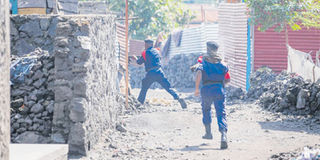Call for strike, protests in DRC after new poll delay

Police officers search a house at Majengo neighborhood in Goma, on December 27, 2018, following a demonstration against the postponement, announced the day before by the Congolese national committee, of the general elections in this area because of the Ebola outbreak and the mass killings of civilians in this trouble part of DRC. - Already postponed three times, the elections are due to bring the curtain down on the era of President Joseph Kabila, in charge of the vast mineral-rich country for nearly 18 turbulent years. (Photo by PATRICK MEINHARDT / AFP)
What you need to know:
Lamuka, a coalition of parties supporting opposition candidate Martin Fayulu, called for cities to be brought to a standstill on Friday, two days before polling day
Kinshasa. A DR Congo opposition bloc called Thursday for a nationwide stoppage and police clashed with demonstrators in two eastern cities after upcoming elections were placed on hold in their region.
Lamuka, a coalition of parties supporting opposition candidate Martin Fayulu, called for cities to be brought to a standstill on Friday, two days before polling day.
On Wednesday, the Democratic Republic of Congo’s national election panel announced the thrice-delayed vote would be postponed in several troubled areas until March.
But it said the vote will continue to take place in the rest of the country as scheduled on December 30, and the next president will be sworn in on January 18.
Sunday’s election will be the DRC’s first presidential ballot in seven years. Legislative and municipal elections are being held at the same time.
In the province of North Kivu, the region most affected by the delay, several hundred demonstrators gathered on Thursday in the administrative district of the city of Beni.
Gunshots were heard over a roughly hour-long period, apparently fired by police to disperse protestors.
In Goma, the provincial capital, demonstrators set up barricades in the districts of Majengo and Katimbo and at the entrance to the university.
Police fired teargas and made at least half a dozen arrests, said an AFP reporter at the scene.
The vote should have been held in 2016 when President Joseph Kabila, in power since 2001, reached a two-term limit set under the constitution.
But he remained in office, invoking a caretaker clause under the constitution.
Opposition anger
The election postponement applies to the cities of Beni and Butembo in North Kivu, as well as to the territory of Yumbi in the southwestern province of Mai-Ndombe.
Around three percent of some 40 million registered voters will be affected by the delay.
But opposition parties described the delay as a ploy to stifle the vote in a stronghold of support.
At a press conference, Lamuka called for cities around the DRC to be brought to a standstill on Friday but said it would still contest the poll.
The announcement by the Independent National Election Commission (CENI) blamed militia violence and an outbreak of Ebola in North Kivu, and inter-communal clashes in Yumbi.
Presidential challenge
Three men are heading a field of 21 candidates in Sunday’s presidential race.
They are Kabila’s hand-picked successor, Emmanuel Ramazani Shadary, a hardline former interior minister; Fayulu, a little-known legislator and former oil executive; and Felix Tshisekedi, head of the veteran UDPS opposition.
The elections were twice postponed until a new date was set for December 23 -- and were then delayed by another week. CENI blamed a warehouse fire that destroyed election equipment.
A vast, mineral-rich country that straddles central Africa, the DRC has a reputation for political turmoil, corruption and poverty.
It has not had a peaceful transfer of power since gaining independence from Belgium in 1960.
In 1996-1997 and 1998-2003 it became the theatre of two wars that left millions of dead and homeless and sucked in countries from around central and southern Africa.
The UN and western powers have repeatedly urged the DRC to have peaceful, transparent and free elections -- a call echoed on Wednesday by the presidents of Angola, Botswana, Namibia, Zambia and the neighbouring Republic of Congo.




